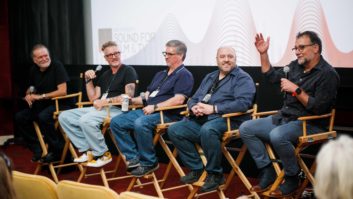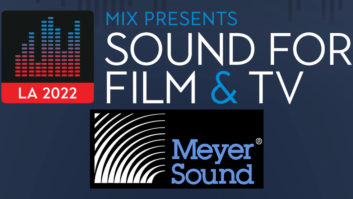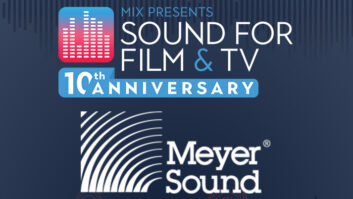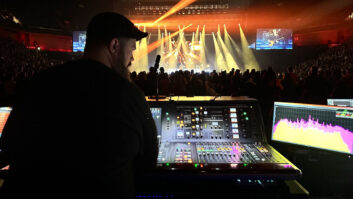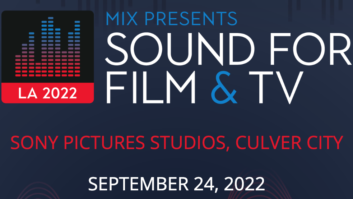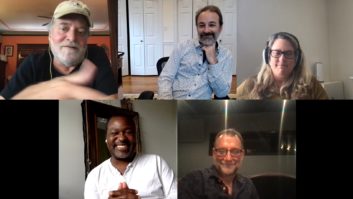Just a shade more than 10 years ago, Walter Afanasieff’s phone rang. Tommy Mottola of Sony Music was on the line asking if the young musician was interested in producing the last song on Mariah Carey’s debut album. That song, “Love Takes Time,” rocketed both the new artist and new producer to the top of the charts.
That was not the first time Afanasieff had been associated with a Number One hit. As a session player, songwriter and co-producer, Afanasieff worked closely with Narada Michael Walden during the late ’80s. While in the Walden camp, Afanasieff contributed to albums by artists such as Whitney Houston, Lionel Ritchie, George Benson and Barbra Streisand.
The San Rafael, Calif., producer had already made his musical mark playing keyboards with the jazz/fusion violinist Jean-Luc Ponty. He also furthered his band career by forming The Warriors with another former Ponty sideman, guitarist Joaquin Lievano, and his days as a working musician paid off by giving him the background and confidence to take an active role as a producer. More often than not, Afanasieff adds keyboard beds and flares to the songs he produces.
This year, as the result of his work with Streisand, Kenny G, Marc Anthony, Ricky Martin, Babyface and Savage Garden, the 42-year-old Afanasieff won his first Producer of the Year Grammy Award.
So, how does “Grammy Award-winning producer Walter Afanasieff” sound?
It sounds delightful. It sounds good enough for me to get a good night’s sleep, because part of my nature is to do the best work that I can possibly do, and the other half of my nature is to worry if it’s accepted or if I get my peers’ approval. I tell people this all the time: “It isn’t about the money or the position of a hit; it’s about the pat on the back that I get from my fellow musicians.” So, literally to get the Producer of the Year Grammy [makes me feel] like now I can get a good night’s sleep, because I know the people patted me on the back and said, “You did a really good job this year.”
Do you feel like it’s been a long time coming?
Well, working with other producers in the past, there was a minute where I thought being a producer was kind of like being a performer or being an athlete where you have your big years and then you fade out. Now I kind of feel, with people like David Foster and Phil Ramone and the breed and the caliber of a producer like George Martin, that it’s really only been 10 years. In the tenth year, I got a Grammy for Producer of the Year. Well, in 10 more years, I’ll get another one, hopefully, and then in 10 more years maybe another one. But in the scheme of things, it’s not a long time coming at all, considering some of these fellows have been doing it for two or three times longer than I have.
Nowadays, it seems that listeners are more sophisticated. Do you think they are more demanding of a song and need to be impressed?
I think those things are chosen for the listener. I think the listener is the last to know, and the listener is going to hear it the way it got through the machinery and popped out the other end. We’re all making better-sounding records every year, because everything is now tuned and quantized and meticulously recorded and on and on.
So, of course, we’re making better-sounding records. Two or three years ago, somebody would be in the studio with a 24-track analog machine with the overdub capacity at the limit, and there’s no more time in the recording studio. Today you don’t have anything to worry about. Have Pro Tools? Go ahead, add 200 more overdubs. Let’s pitch ’em all, fly ’em all in half an hour. So now with everything we have at our disposal, everybody’s making the biggest, most amazing sounding records. I think it’s great, because it gives us more to compete with, more to advance with. I think the listener is told, “This is the sound that’s coming out now.” It’s not like anybody out there knows what it’s about. Nobody can explain what they are listening to, and at the end of the day, the song is still the song.
So, the goal is still to find that connection between artist and listener?
To me, the technology doesn’t matter. There’s going to be a song coming out tomorrow-let’s say it’s someone like Sarah McLachlan, sitting at the piano playing and singing, and nobody pitched her vocal. Nobody overdubbed her. It’s just her and the piano, and it’s “Angel,” and it’s the most beautiful song. It’s a huge hit, and at the end of the day, it’s about the song. Carlos Santana? I mean, my God, the whole phenomenon of 27 kazillion Grammys and 95 million records sold. Why? Because we’ve finally decided that the timing is right and that’s what’s going on this year.
It’s kind of like we’re all making clothes. I’m Armani, and he’s Oscar de la Renta, and over there is Calvin Klein. We’re making these outfits for these people to wear. Everybody is wearing black leather pants and black leather jackets. In a week, it’s going to be white leather pants and white leather jackets. So what we’re doing is making these temporary fads in music. You have your Britney Spears, your Christina Aguilera, your Jessica Simpson and your Mandy Moore. Over on the male side, you have your boy bands-‘N Sync and Backstreet Boys and all that. In between you have this white girl who can sing like Mariah Carey, the white boy group trying to sound like Boyz II Men and this Latin artist who yesterday was singing in Spanish, today he’s singing in English.
Okay, so it cross-pollinates. It’s like one goes into the other that goes into the other, and we have this big wash. The wash comes out with ‘N Sync with Gloria Estefan. Okay, great, we’re more intelligent for that. We’re better people for that. Then Carlos Santana is doing this song with Rob Thomas. Who knew a year ago that this street-y, Latin salsa flavor, kind of edgy, rock-voiced song is going to hit us all so hard that it is going to be the biggest song of the year?
I think it’s amazing. It’s so wonderful because it gives [something back to] young people and young listeners who don’t know better because their headphones are filled 24 hours a day with Limp Bizkit or Britney Spears. Now they become aware of what Latin music is and what a rich history Santana has, and it makes us all more intelligent. I think it’s great, because tomorrow we get to come up with a song that has a Latin-based flavor with a boy band singing in Spanish. We get to choose more colors and styles. It’s not just about listening to segregated types of music. We’re inventing new music.
Is it difficult to come up with new things for an album you know isn’t going to come out for nine months?
It’s like time is your worst enemy, because of the new advances in music and technology. If you’re going to be in the studio for a year making a record, a year after you started it the first song you did is probably going to be obsolete. During that year four fads would have come and gone.
I think that, again, you just try to believe that a good song is a good song. Sometimes we have to go back and remix things and add a few sparkles that are the flavor-of-the-month sparkles. I worked on an album that is just coming out that we started three years ago. [Lara Fabian] is a Canadian-French girl who is an R&B singer with an amazing voice. She got a huge record deal at Sony Music right around the time that Celine Dion was really big. We went into the studio and we started working on the most beautiful music I’ve ever had a chance to make. But now we’re all sitting around going, “Hmm, that song is now two-and-a-half years old, and it doesn’t sound like now.” So, we’re going back in the studio and redoing some of the stuff.
Are you redoing the whole thing?
Not really, just the colors around the vocals. Her singing is her singing. I’m talking about the sound of drums, the sounds of keyboards. Sometimes just on a musician level, I wouldn’t want someone to hear an old patch from an old synthesizer. Maybe that’s a cheesy sound now, you know? It’s kind of like we’re all doctors; we all have to keep up on our medicine journals.
I know that I have to be current and provide the artist with what they really don’t know about. I don’t really expect Celine or Mariah to come in and say, “Hey, man, I got this great new sound or this great new sample.” It’s up to your programmers and engineers and everyone in the studio to be really current and to know the cool things. When we were doing the Savage Garden album, Daniel [Jones] and Darren [Hayes] brought with them their current Australian bag of tricks. They said to me, “We like these, but we know this stuff. We want something more.” I’m going, “This stuff is awesome.” I got caught in a dilemma, because they thought their stuff was old, and I was thinking their stuff was so new that I just want to do that.
So, we sat around the studio and I was hell-bent on creating sounds and loops and things that no one had heard and no one had used. I was betting on it and thinking, “Man, I hope I’m not doing something cheesy or old, because it was really new to me.” It gave me this new sort of insight into synths and electronics and stuff that I didn’t have before. It opened up some of my creative juices and my technical juices. It was almost like we were sitting at a Moog synthesizer trying to program sounds and squeeze them with filters and all kinds of things. It just resurrected this place that I used to have that got halted because of technology.
And now you’re in the studio with more of a folk band, Train. How much of a change is that for you?
Train is five guys that are a pretty standard rock ‘n’ roll band. Over the past two or three years, these guys have been traveling the world playing their songs and writing new ones. On their own, they’ve developed their own likes and dislikes.
Pat [Monahan], the lead singer, has taken up playing saxophone, trumpet and vibes, and he’s an incredible percussionist. The drummer has developed his own drumming to the point that now he uses some drum machines. So, when we got into the studio, he would say, “This is a good time for me to get my drum machine out. Instead of just playing drums I’d like to do some drum loops.” Pat would say, “This is a great time for me to play sax or trumpet or vibes.” The sax, trumpet and vibes aren’t technologically advanced things, so I was wondering how I was going to put those things in a rock band. That was a big challenge, but it worked out, because if you take that and put it into a computer and chop it up and you do things to it, it sounds incredible. We’ve come up with a pretty fresh, new take on a very old thing.
How did this collaboration come about?
What happened is that record companies tend to take something that’s currently a good thing for them and they milk it. So, apparently because of the Savage Garden thing, Columbia Records looks at Savage Garden as a band, although, in reality, Savage Garden isn’t really a band. Columbia said, “You did so good with that band, how about trying it with this band? And not only this band, but what about Aerosmith?” I’m going, “Whoa. Hey, man, this is really good. This is what I’ve wanted to do for a long time.” I know I can do this.
This seems to be a wild shift from just three years ago?
That goes back to your first question about how it feels to win the Grammy. Well, it feels especially good to me, because I didn’t do what I had been doing for so many years- you know, the Mariah/Celine/pop-ballad years. It gave me a chance to prove to myself that I don’t need Mariah Carey to keep working.
Mariah and I, temporarily I hope, have parted ways. It’s not like I was out to prove it, but this was a really strong year for me to go out and prove to myself that I’m not just Mariah Carey’s producer or Celine Dion’s producer. It was really good because I didn’t work with either of those two women this past year. It is a different take on my career.
Now I’m writing songs with a lot of artists. Just the writing of songs is so wonderful because it’s not just, “Okay, what ballad do you want to do.” No, this is writing, and the writing is setting up the producing, and a lot of this stuff is very diversified.
Well, with Train and with Aerosmith, it’s now a matter of talking to five people instead of just one. Do you approach the sessions differently?
Well, it has to be a community thing. I’m coming into a family. I’m not a member of the family, but I’m now asked to join the family in a certain way. What I’ve learned is that you have to keep their sound. I come in with all my stuff, and I could just overtake their stuff. The power a producer wields in the studio is that you can take away who the band is. A lot of producers might not realize that because they go so far into creating what they want to do with their sound that they are just using the band as their own instruments. I try to be careful.
So, when I’m in the studio with Train I have to say, “I want this to sound like you, unquestionably you.” It can’t sound like me. What am I gonna make those guys sound like? Mariah Carey? So, there’s this balance of keeping the family sounding like they sound, but with my influence and direction and production.
In the past, you’ve talked a lot about technology and how it’s changed things in the studio. Over the past year, has there been a tool that’s been interesting or creatively inspiring?
I would say it would have to be having the ease of having the digital workstation. You’re not running out of tracks. At the end of the day, you’re not worried about this little noise over here because you can just go in there and erase it immediately. It makes life easier, it makes life simpler for me, and of course, if there’s a really great performance from a singer but it’s a little out of tune, we’ll pitch it.
All that stuff has made life really, really great for us, but I’m worried about it. I’m worried that we’re not making records the way we’re supposed to make them. I heard a country song the other day by a really nice woman, and it was a really nice song, but her voice was so completely AutoTuned that it wasn’t her voice. Not as much as Cher sounded in “Believe,” but almost. For lay persons out there they wouldn’t really notice it, but for us musicians and industry guys, we just go, “Oh my God, why did you do that?” It was such a crime to me to hear a beautiful country record with a great country singer, but it wasn’t her singing, it was a computer singing for her.
In the old days, it could be argued that the engineer was one of the most important persons at a session. They made the microphones sound right, they set up the rooms, and they did all the behind-the-scenes stuff that made the audio better. Is the programmer almost more important than the engineer is these days?
In some cases, yeah. In some cases, the programmer is now the engineer, because we’re not making records on tape anymore. We’re not making records through microphones, except for vocals. Everything else is digital-to-digital, straight into the computer, so the programmer has become the engineer.
A few engineers that I work with are looking at the future. It’s kind of like driving; you constantly have to be looking in your rear-view mirror as you’re looking through the windshield. Some engineers really took it upon themselves to learn where the future is going and they went and they woodshedded and they got their Macintosh computers and they got their Pro Tools. So, you have very smart engineers who can actually go digital or go to tape.
Is it going too fast? Is it getting too widespread? Is it getting to be too many people so that music will become such a cheeseburger industry that it’s not even going to be real cheese? I hope not. I still believe that it’s all in the song.

